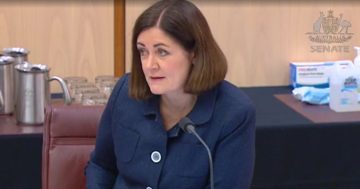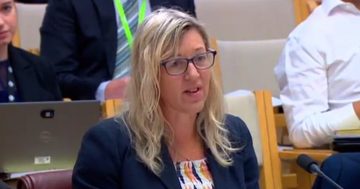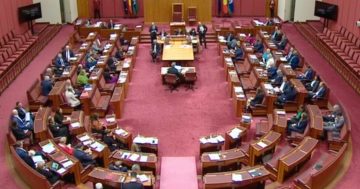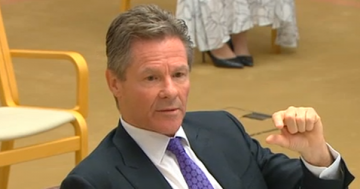Half arsed security measures are normally worse than useless in addition to being very expensive.
The Bollards blocking access to the doors of Parliament House would seem to fall into this category and were the cause of amazing scenes in Senate Estimates yesterday. The Hansard is here but read on for the relevant extract starting on page 10:
Senator FAULKNER—That is excellent. Thank you for that. Another issue that I have addressed at a number of estimates committees now is the retractable security bollards here at Parliament House. Things are not going well with those bollards, are they Ms Penfold?
Ms Penfold—They could be going better, but I think that all we are seeing at this stage are inevitable teething problems, particularly, I suspect, related to the fact that the bollards are built to be up most of the time and going up and down some of the time. Because of the way things worked out last year with getting the advice about when they should be up and when they should be down, they were basically all locked into the ground for the best part of six months. So we are probably seeing a few problems related to that and to the effect of that on the mechanisms. We are seeing a few other problems that are purely, we believe at the moment, teething problems relating to how they were installed and how some of them operate. I have some figures, if you would like them, for those things.
Senator FAULKNER—Okay. Why not, if you can, give us some figures about these problems. That would be helpful, I am sure, for the committee.
Ms Penfold—The figures suggest that the bollards have operated approximately 10,000 times since we put them into operation at the beginning of January.
Senator FAULKNER—You mean they have retracted 10,000—
Ms Penfold—They have gone up and down.
Senator ROBERT RAY—Where are you talking about? How many sets?
Ms Penfold—I am talking about the sets at the three slip road entrances and exits, so I suppose six.
Senator FAULKNER—In all three wings—ministerial, House and Senate?
Ms Penfold—The three wings, that is right—entrances and exits. So we are talking 10,000 operations. We have got, in that time, 18 incidents recorded by our security people. There is another one that is recorded by the maintenance people, but it did not cause any sort of incident, as another repair thing. So 18 noticeable incidents since we started using them. Of those, 14 seem to be some sort of mechanical failure in the system.
Senator FAULKNER—What are the other four?
Ms Penfold—There are two recorded as operator error; one recorded as a road loop problem, which seems to relate to a taxi turning around at a point where the road loop would have sensed that it was going in one particular direction; and one where one of our vehicles actually clipped the swipe-card reader and damaged it—and I do not think we can blame that on the bollards.
Senator FAULKNER—No, I do not either. That caused a broader mechanical failure with the bollard?
Ms Penfold—No, I think it just meant we had to fix up that bit. It was a recorded incident.
Senator FAULKNER—Because the electronic tag mechanism didn’t work?
Ms Penfold—The electronic tag mechanism certainly was not working while it was dismantled, yes, and so that had to be fixed.
Senator FAULKNER—Okay. Are you able to say, of these 18 instances, where they were—which ones were on the Senate slip road, which on the House and which on the ministerial wing?
Ms Penfold—I do have the figures by reference to that, but in terms of identifying the fault ones—are those the ones you are interested in, or in general? I can give you a general figure.
Senator FAULKNER—Yes, just give us the general picture.
Ms Penfold—So far, in the Reps we have three at the entry and two at the exit; in the Senate, one of each; in the ministerial wing, two at the entry and three at the exit.
Senator FAULKNER—There was a failure in these bollards last Thursday and last Friday mornings, wasn’t there?
Ms Penfold—Certainly on Thursday, and I have a record here of a fault in the bollards at the Senate side on Friday, but that is not one of the ones that has been recorded as an incident.
Senator FAULKNER—So faults like that, when the orange coloured cones are put across the driveway, are not recorded in these figures?
Ms Penfold—Generally they would be. But I believe—and there is partly an issue because this has all happened at the last minute—the one that happened on Friday involved someone identifying a fault in the bollards and deciding to fix it, rather than anyone getting caught or having trouble with them.
Senator FAULKNER—Have you received any complaints about the operation of the bollards?
Ms Penfold—We have received a number of comments about the whole arrangement, yes.
Senator FAULKNER—We will come to that, but I am talking here about the mechanical failures. Have there been concerns expressed? There have been at the ministerial wing, haven’t there?
Ms Penfold—Not that have been reported to me. I would be surprised if in some cases people who got caught in them did not express some fairly firm views about the operation of the bollards, but nothing that I am aware of that counts as a formal complaint has been drawn to my attention.
Senator FAULKNER—Have there been security issues in relation to the Prime Minister at the ministerial wing? Is it true, as I was informed by one of the security gentlemen, that he has had to use the exit ramp to enter the building and the like? Is that right?
Ms Penfold—I am not aware of that, Senator.
Senator FAULKNER—Have we had a situation where, because of bollard failure on entrance ramps, cars have used the exit ramps and vice versa—that instead of going out the exit they have gone out the entrance?
Ms Penfold—It is quite possible, given the number of incidents and the way some of them happened, that one of the ways of addressing those failures immediately was to redirect vehicles to the other end of the slip roads. But I do not have any formal reports of that happening or of that causing any complaints.
Senator FAULKNER—Are you generally disappointed with the way the bollards have not worked?
Ms Penfold—Obviously, I would have been much happier if they had worked perfectly. But I think it is reasonable to expect it in a system with a reasonable amount of complexity. With, as I mentioned earlier, the problems of the things having been locked down for six months, it is reasonable to expect that there will be some teething problems. If we are still having teething problems in six months I will be very disappointed.
Senator FAULKNER—There have been some suggestions made publicly that the way to deal with this is to have the things permanently retracted. My instinctive view in relation to that is that it makes a mockery and a nonsense of having the things in the first place. I am not sure whether you would agree with that or not, Mr President.
The PRESIDENT—One of the things the Speaker and I spoke to the secretary about was trialling, during heavy volume times, such as between eight and nine in the morning, retracting the bollards for that hour and having a security person there checking the passes. That was not because of the problem with the bollards; it was a question of whether it would make life easier for everybody concerned. There seems to be a misunderstanding by some people, particularly the taxi drivers, that they cannot come up there. But they can if they have a pass holder. That is what it is all about. As far as the bollards are concerned, as we all know, they are in use at other parliaments around the world. I presume they had problems with them initially. But they are an accepted fact of security and we intend to keep using them. I just hope that they can sort out the few technical glitches. I am disappointed that we have had problems with them. When you spend that amount of money, and with the technology that is around—bollards are nothing new; they have been around for quite a while—I would thought that the ones we purchased would have been perhaps more efficient. But we will wait and see. In the meantime, we are going to trial having the bollards down for an hour between eight and nine in the morning.
Senator FAULKNER—You are going to trial that, are you?
The PRESIDENT—We are doing it this week, to see if it will make life a bit easier for those coming in to work of a morning.
Senator FAULKNER—Do you think that somewhat defeats the purpose of this huge expenditure of public money?
The PRESIDENT—No, because there will be a security person there checking people through.
Senator FAULKNER—Yes, but how is a security person going to deal with a rogue vehicle? Are they going to stand in front of it?
The PRESIDENT—Vehicles will still have to stop to have their passes checked.
Senator ROBERT RAY—What if they have a bomb on board?
Senator FAULKNER—That is the point. I have always been doubtful about them, although I am not going to go through past evidence. I have been concerned, and I have expressed that, about the type of bollard that was purchased. I have been concerned that an overseas supplier was used when there is, I think, very good technology here in Australia—better technology—that was not accessed by the parliament, which I found disappointing. But now that the things are in place, I do not understand how that expenditure of public moneys can be justified if the things are retracted for a significant period in the day. How do we justify such expenditure when the things are permanently down because they are not working too well and people want to get into the parliament quickly? It is a bit illogical, isn’t it?
The PRESIDENT—For an hour in the morning in the busy period, we thought that—
Senator FAULKNER—Heaven forbid, what if a terrorist decided that that was the hour that they might attack the building?
The PRESIDENT—Whoever comes through there has to have a security pass. Whether the bollards are up or whether they are down, it is still the same issue.
Senator FAULKNER—Are you seriously suggesting that a terrorist would be flashing a security pass?
The PRESIDENT—No, but the person who is in the vehicle would have to have a security pass or they do not get through.
Senator FAULKNER—But the bollards are down—they just drive through.
The PRESIDENT—You are just saying that they are going to come hurling straight through?
Senator FAULKNER—Exactly.
Senator ROBERT RAY—Usually suicide bombers do not worry about a speeding fine. This is the dilemma. I for one actually support you on the bollards issue. I think it is a necessary security thing. I would just urge you to persist until they work. I am not sure the security guard sends the right signal. I cannot understand why more people do not come in like I do, through the basement.
The PRESIDENT—That is the other thing we are doing: we are encouraging more people to come in through point 1, or through the basement. Arrangements are being made to make it a lot easier for people to do that.
Senator FAULKNER—On the staffing and appropriations committee, we were most concerned about the knock-on consequences of this—that is, how do non-MPs get access to the building? It seems to me that you have half-solved that problem. They can use their pass when the husband, wife or partner drops the other one off—they use the pass, go up and get dropped off—but how does that work when they are being picked up? The person in the building has the pass, not the husband or wife coming to pick them up.
The PRESIDENT—They have to be picked up outside, either at point 1or—
Senator ROBERT RAY—Let us go back to that. The Joint House Committee took this over, promising to solve it, and I notice they have not. When it is wet or dark at night, people still have to cross that road, go down the stairs or through the basement and up to get picked up—is that right?
Ms Penfold—Ideally, they will go down to the front basement entrance.
Senator ROBERT RAY—Ideally I would go out and run half a marathon at lunchtime, but you and I both know that neither is going to happen. What they are doing is parking directly outside and, at the moment, the traffic hazard is going up massively. There are ‘no parking’ signs along the slipways instead of ‘no standing’ signs, so people are not even bothering to come up through the bollards; they are just stopping dead and letting people off and they are crossing the road dangerously. Those anticipated problems have not been solved. They have been partially solved, I agree, but they have not been solved.
Ms Penfold—There is some more work that is to be done on the traffic management side of it that simply was not able to be done in time. There will be some marked stopping spaces down on Parliament Drive, below each of the entrances. There is also some work to be done, which will take a little bit longer again, to pursue the idea of turning Parliament Drive into a one-way road, which will also address a number of those issues. In the meantime, the forecourt basement car park is an option. We cannot force people to go down there—I agree—but we have not yet come up with a practical alternative method of letting, if you like, stray, unknown vehicles into the slip-roads safely.
Senator ROBERT RAY—No—you have. You have worked out a way of letting them in to drop them off; you just have not worked out—
Ms Penfold—No—they do not count as unknown vehicles. That is the distinction, and that is the advice we are getting from the Protective Security Coordination Centre.
Senator ROBERT RAY—The taxi with a staffer in it is a known vehicle; a taxi about to pick up a staffer is an unknown vehicle. Therefore, we have a differential treatment.
Ms Penfold—You are absolutely right: there is a risk management element in this. We are not looking for absolute purity, because if we were looking for absolute purity we would not be letting in any taxis at all. But we have been advised that the risk of a taxi that a staffer happens to get into at the airport—
Senator ROBERT RAY—I accept that.
Ms Penfold—and turning up here, happening also to have a bomb in its boot, is much lower than the risk of permitting any taxi to turn up at the entrance and the driver saying, ‘I’m here to pick up a Mr Smith; let me in, please.’ That is the distinction we have drawn.
Senator ROBERT RAY—I have no argument with any of that. It is just that you have come up with a system of differential treatment that still leaves problems. You say you are going to do further work on it. We looked at all this last year; we were looking at this in March last year. What is the timetable for changes? I hope it will be done sometime before May. The weather is fairly benign at the moment. It is light most of the time when people leave. You have not dealt with the danger of people just pulling up willy-nilly on the road out there. Once you get to the middle of winter and there is wet weather and much harsher conditions, it is going to be a bit of a nightmare. I imagine that the House of Representatives side is twice as bad as the Senate side—I have not been over there, but I imagine it will be.
Ms Penfold—The parking signs on either side of Parliament Drive will I hope be going in during the next non-sitting period—so that will be starting next week, in fact. Turning Parliament Drive into a one-way road is a slightly longer process. The other point I should make in terms of timing is that we were talking about it in March last year—in fact, we were talking about it well before that—but in the end it was only in early November last year that we finally got the advice from the Protective Security Coordination Centre. There are a variety of other possible bits of solution to the problems of people going down onto the road and being picked up or dropped off there. As I say, we have provided one option, which is not a particularly difficult option to use. There has been talk about building secure shelters down below the stairs on each side. That is still an option, but it is an option that the last time we looked at it was costed at somewhere between $750,000 and $1 million. That seems to me to be a lot of money to spend before we know that it is necessary. Whether we spend that simply because people will not use the satisfactory option that is provided is a question for the Presiding Officers in the end.
Senator WEBBER—You will know that it is necessary as soon as a female staff member is attacked at night while having to wait down there, as my staff had to last week.
Ms Penfold—But a female staff member does not have to wait down there. A female staff member has the option of going down to security point 1 and standing there waiting with PSS guards behind her and AFP people driving round in front of her. That is as secure as anyone can get.
Senator WEBBER—I suggest that that is not overly well known to interstate staff who do not come here that often. They do not even know where security point 1 is.
Ms Penfold—I will take your word for that, but we have put out quite a lot of information on that, including some circulars with maps which were emailed to everyone with an email address in this building.
Senator ROBERT RAY—I take it that you will be setting the example and parking in that car park now, to show everyone just how easy and safe it is?
Ms Penfold—In the—
Senator ROBERT RAY—In the public car park.
Go on, download the whole hansard for more of this comedy gold.



















